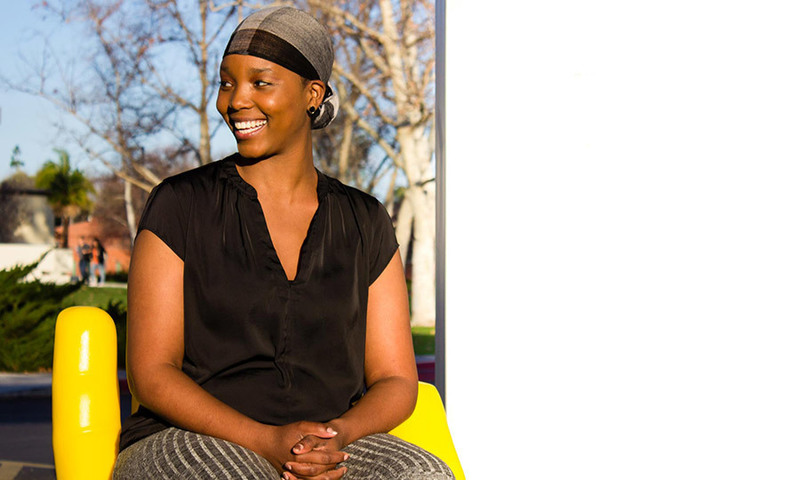ŌĆ£Biola is just a little part of my experience now,ŌĆØ says Senior Film Major Diamond Glaze.
ŌĆ£IŌĆÖm having to tend to so many other things college students donŌĆÖt have to.ŌĆØ
ItŌĆÖs true, Diamond has a lot on her plate. In the past two years she got married, left Biola, had a baby, returned, and jumped right back into classes. SheŌĆÖs a wife, a mother, a Resident Coordinator, and storyteller. She writes screenplays, and like many creatives, sheŌĆÖs found pursuing her passion difficult with such weighty responsibilities, especially at Biola.
ŌĆ£My experience with my screenwriting program has been an emotional journey for me,ŌĆØ she says.
Her journey was emotional because trying to fit into a new group of people is difficult. Upon coming to Biola she started picking up on what was ŌĆ£inŌĆØ with film majors. Actors, directors, movies- she started learning all the right ones. She also began to realize that most of what was ŌĆ£inŌĆØ was also . As a black woman, there were directors and actors of color that she adored, yet very few people seemed to know of them.
Fitting in
It wasnŌĆÖt just Hollywood trivia she needed to know, but also how to write a good script. Diamond started writing the most intuitive way she knew: she put all her focus into crafting interesting characters. But her stories werenŌĆÖt fitting in either.
Her professors suggested more story structure. The problem was, when her stories fit neatly into every beat a screenplay should have, they felt dead. Her professors loved her work, but she didnŌĆÖt. It felt inauthentic, and devoid of creativity.
ŌĆ£I was like, I guess I could do this to get the bills paid!ŌĆØ
She ended up in a group of friends who all felt like outcasts in the film program; misunderstood and frustrated with the status quo. They felt like a safety net in the midst of unfamiliar territory.
But even so, there was still a crippling fear of inadequacy. Her difficulties in the program stemmed from this fear.
ŌĆ£I was just so scared, because itŌĆÖs like, ŌĆśwhat do I have to offer?ŌĆÖŌĆØ
With no idea how her experiences and perspective could translate into original work, the rigid rules and the fear of failure were a hang up she couldnŌĆÖt shake.
ŌĆ£It did become lonely because I didnŌĆÖt put myself out there. Now I have a kid, and IŌĆÖm married, and you start to get a sense of what you want. And I wanna put myself out there.ŌĆØ
Diamond found some direction when she took a Creative Writing class with Professor Buchanan. Three times per semester she was required to submit a short story that everyone would read and critique. Her first read like a screenplay: it was structurally correct, but it didnŌĆÖt sound like her.
Buchanan, or Buck as students like to call him, encouraged her to let go of the structure she had learned and just write a story.
So she decided to write a narrative about the experience of giving birth. The class was blown away. It was uniquely hers, it was engaging, and original.
When Diamond left, she came back with a renewed passion for storytelling. She decided to give it her best shot, despite her previous setbacks. She started putting herself out there.
She started reaching out to people in hopes of creating with them. Coming back and having most friends graduated took away a safety net of people to rely on. She needed to branch out.
She even began collaborating and meeting with people outside of Biola. She created a space with a friend from her church where they share their creative projects and give each other feedback. If nothing else, it is simply a space to share.
She also heeded the advice of one of her toughest teachers. ŌĆ£Before you can break the rules you need to learn them.ŌĆØ Though structure often kills her soul, sheŌĆÖs realized it has helped in a lot of ways. Her teacher choosing to push her rather than allowing her to have it her way was painful, but in the end, it taught her how to structure her stories.
ŌĆ£SheŌĆÖs gotten easier since the first class I took with her, or maybe IŌĆÖm just more used to her,ŌĆØ she jokes.
As she finishes her undergraduate classes, and the emotional journey in screenwriting begins to come to a close, the wild ride is coming to an end. Thankfully, it is ending with a bit more security than before. Diamond may not fit into the mold of a typical Biola student, but she knows what she wants and sheŌĆÖs doing what it takes to get it.
Want stories like these delivered to your inbox every other week? Subscribe to our newsletter below.
 Biola University
Biola University



